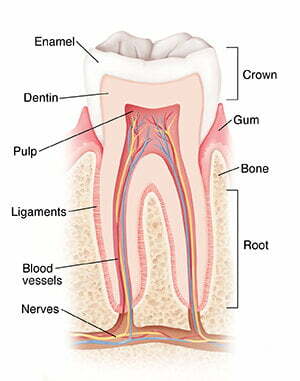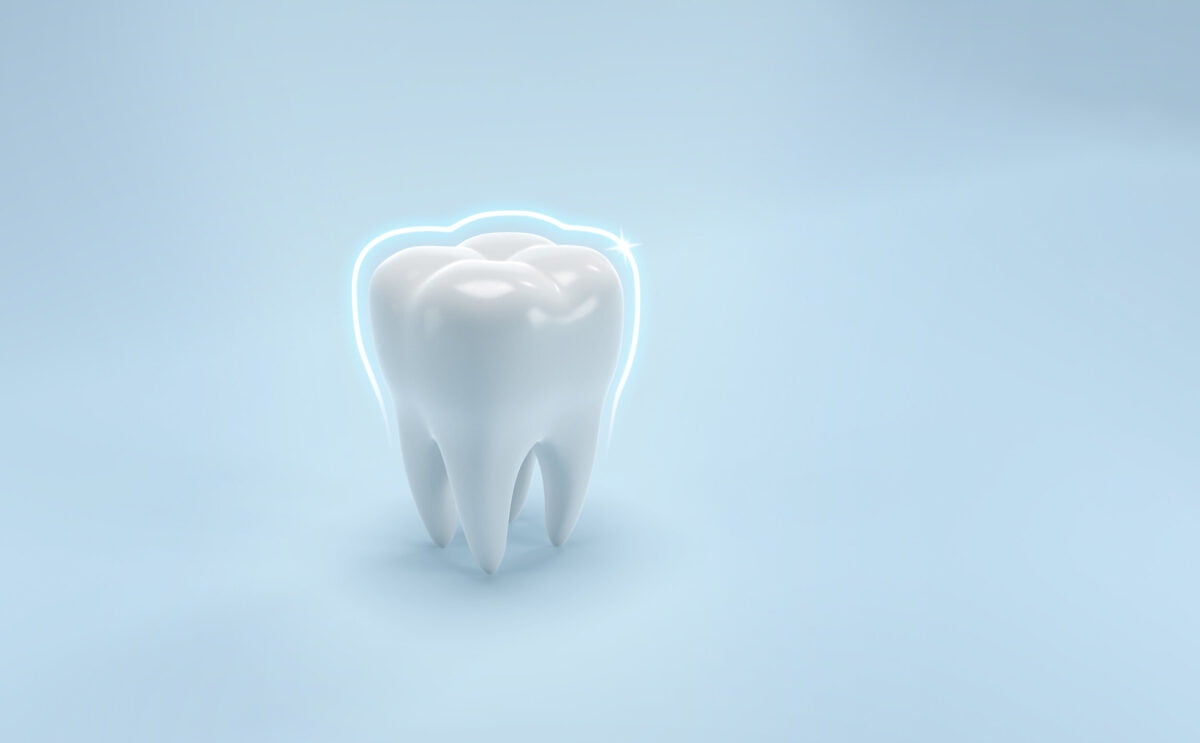A root canal (also known as endodontic treatment) is a safe, effective way to remove dying or dead (necrotic) nerves from a tooth, allowing you to keep your tooth rather than having to pull it out.
When are Root Canals Needed?
Root canal treatment remains, for many patients, the only viable option to retain a tooth that has suffered significant trauma or a deep cavity.
From the Canadian Dental Association:
“The space inside the hard layers of each tooth is called the root canal system. This system is filled with soft dental pulp made up of nerves and blood vessels that help your tooth grow and develop. When bacteria (germs) enter your tooth through deep cavities, cracks or failing fillings, your tooth can become abscessed. An abscessed tooth is a tooth with a dying or dead nerve tissue within the pulp. If a nerve within a tooth is dead or dying, it needs to be removed. An abscessed tooth may cause pain and/or swelling. Your dentist may notice the infection from a dental x-ray or from other changes with the tooth. If left untreated, an abscessed tooth can cause serious oral health problems.”
The Process
In most cases, our team at Toothworks Dentistry will provide root canal treatment to our patients who require it. If the anatomy of the nerve in your tooth is very complex, or there are other complicating factors, we may refer you to an endodontist. An endodontist is a dentist specializing in root canals. The majority of the time, we offer the convenience of having this treatment done in our practice.
Root canals require local anesthetic (freezing), which will be applied to ensure your comfort for the entirety of your treatment.
The first step is to make a small hole in the top of the tooth, to access the nerve chamber (a.k.a. pulp) of the tooth. Next, we remove all of the nerve tissue and remaining blood vessels within the nerve chamber, and within the root(s) of the tooth. We’ll do this by using very fine dental instruments. Then the nerve chamber and canal(s) are disinfected, shaped, filled and sealed.
The opening of your tooth will then be sealed with a temporary or permanent filling, depending on how we have chosen to restore the tooth. This creates a seal that will prevent any future infection and protects what’s left of the tooth.
Prior to your treatment, we will discuss restoration options. The choice of restoration will depend on the strength of the remaining tooth. A crown is almost always a requirement for a tooth, following a root canal. Teeth that have had root canals, because they now lack a nerve and blood supply, are considered “non-vital.” These non-vital teeth become desiccated and brittle over time, making them prone to fractures and breakage. For these reasons, placing a crown (a.k.a. cap) is the most predictable way to restore a root canal treated tooth. Research has proven that root canal treated teeth are much less likely to fail if they have been restored with a crown.
Please note: Despite a root canal treated tooth being “non-vital,” it has several natural qualities that allow this tooth to safely remain in your mouth. In fact, it is only this tooth’s lack of a nerve and blood supply that differentiates it from all of the other teeth in your mouth. All of the natural attachments between the tooth and bone (a.k.a. periodontal ligaments or PDL) remain. In fact, new periodontal ligaments will form in the months following a root canal. Also, all of the gum (gingival) tissue around a root canal tooth is exactly the same as the gum tissue found in the rest of the mouth. All of these natural attachments remain unchanged on root canal treated teeth. For these reasons, root canal treated teeth aren’t exempt from pain and discomfort. If a root canal tooth suffers trauma or heavy bite forces, the nerves in the periodontal ligaments and gum tissue that attach to the tooth will respond normally, and the tooth will hurt. This segways into our next topic of conversation… do root canals hurt?
Do Root Canals Hurt?
It’s not uncommon for people to get uneasy at the mention of a root canal. They seem to be associated with pain, based on the many conversations we’ve had with our patients. Root canals don’t hurt. You will be free of pain during your root canal treatment, thanks to the wonder of local anesthetic.
The most likely reason the word “root canal” is associated with pain (more often than not) is that people who require a root canal are suffering from pain. Typically a necrotic (dead or dying) nerve in a tooth, and any associated abscess, is the source of significant pain and discomfort. Root canal treatment alleviates this pain. The pain that immediately follows a root canal can almost always be predicted by the pain that preceded the root canal (ie if a tooth hurts before your root canal procedure, it will likely hurt temporarily when the freezing comes out after the root canal). If there was no pain prior to your root canal, it’s most likely you will be pain free after your root canal. Most of the time, teeth are completely comfortable 24 hours after a root canal.
In a nutshell, root canals have a “bad rap” when it comes to being associated with pain, because generally, those who need a root canal are in pain to begin with. The root canal procedure itself is not painful, and it rarely generates any newfound pain.
Aftercare
It’s common for your tooth to be tender for the first week or two after treatment. After all, your tooth has undergone treatment and needs time to heal. Excessive pain or swelling are not common — if you experience these, please call our office immediately.
Because root canals save the original tooth, it is still very possible to develop a cavity or gum disease. Root canal treatment does not protect your tooth from other types of damage. We highly recommend a crown, proper oral care and regular dental visits, to ensure that the tooth lasts as long as your other teeth.
Root Canal Retreatment
Most root canal treatments are successful. Research shows that approximately 95% of all root canal treated teeth have successful outcomes. Which means, approximately 5% of the time, root canals fail. It’s interesting to note that of those “failures”, 85% are teeth that have not had crowns placed on them. Simply having a crown made for your tooth after a root canal significantly minimizes your risk of root canal failure.
In the event of a “failed” root canal, a second root canal treatment may be an option. We call this a “retreat.” As the name implies, the root canal filling material is taken out, and the root canal procedure is repeated. Root canal retreatment therapy is quite predictable in many circumstances, and has very favorable odds of success.
Debunking the mMyths
As per the Canadian Dental Association:
“The Canadian Dental Association (CDA) and the Canadian Academy of Endodontics (CAE) caution that misinformation about root canal treatment is circulating in the public domain. Patients are advised to discuss any questions or concerns about root canal treatment with their dentist and endodontist to ensure that unnecessary anxiety or fear of developing other health problems does not result in treatment delays which could further compromise the integrity of the tooth.”
If you are concerned about the safety of root canals, we highly recommend these trustworthy sources of information, which address common misconceptions about root canal treatment:
-
The Canadian Academy of Endodontics: Safety of endodontic treatment
-
The Canadian Cancer Society: Do Root Canals Cause Cancer?
We’re committed to your ongoing oral health. If you’re experiencing tooth pain or sensitivity, or are overdue for your regular dental cleaning and exam, please contact our office to book an appointment.
Yours in better dental health,
Toothworks







